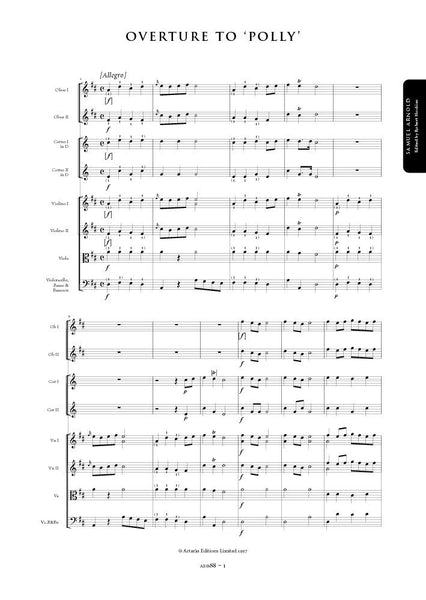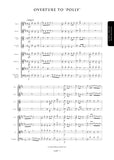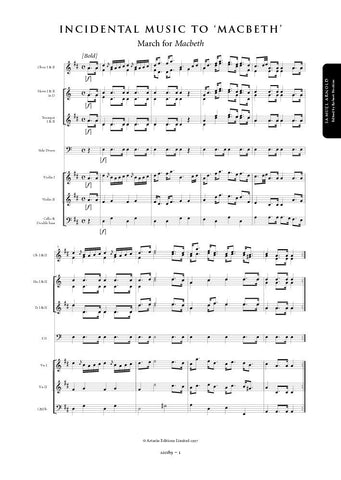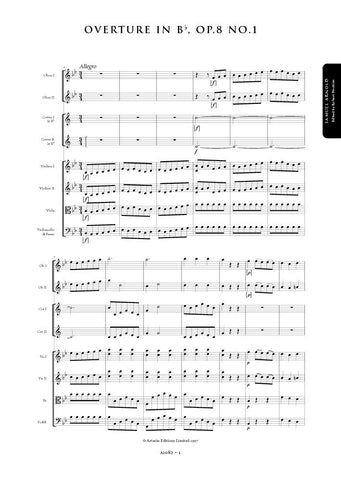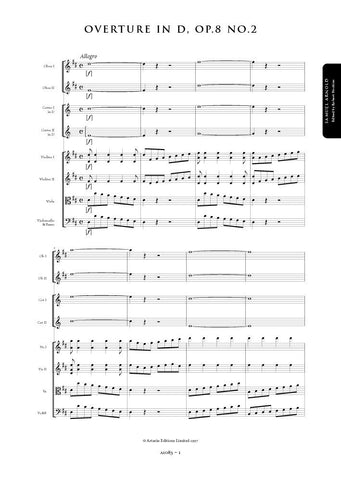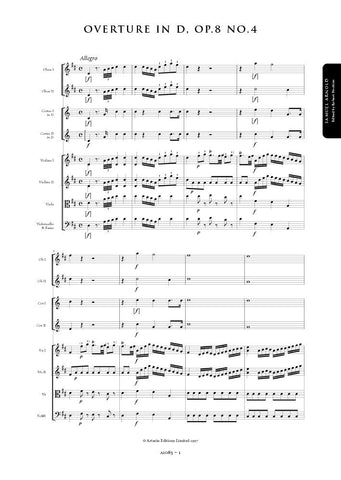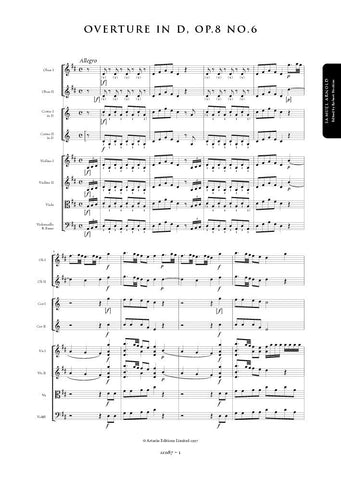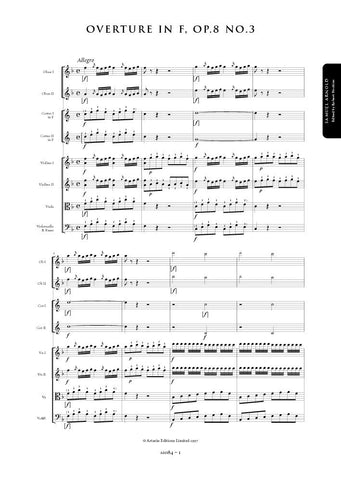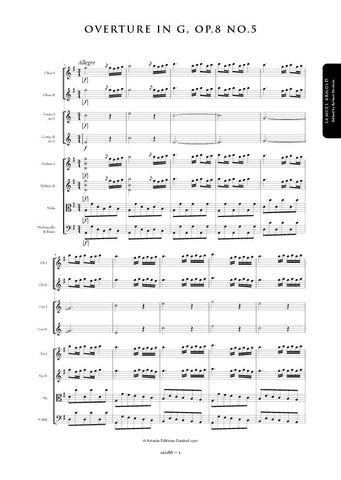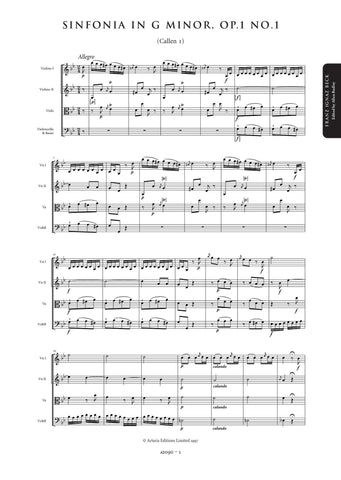Arnold, Samuel: Overture to Polly (AE088) – sheet music
Previous Product Next Product
Description |
Arnold, Samuel (1740-1802)
|
||||||||||||||||
Audio sample |
|||||||||||||||||
Details |
The long-awaited Haymarket performance of Polly, possibly stimulated by a new Drury Lane production (29 January 1777) of The Beggar's Opera re-scored by Thomas Linley, was only a fair success. The problem was partly that Hester Boyd in the title-role sang "horribly out of tune" but more, that Polly was a very different kind of work: The Beggar's Opera is a colourful political satire, mainly at the expense of Sir Robert Walpole, whereas Polly explores the idea of nature as culture. Set in the West Indies, the heroine Polly, rejects the values of her materialistic society to live apart from other whites, sharing the life of the wilderness with her Indian husband, Cawwawkee. Arnold captures the shift in perspective between the The Beggar's Opera and its sequel by looking backwards in the overture and forwards in subsequent instrumental dances. By composing a medley overture of themes culled from The Beggar's Opera, Arnold cunningly recovers the heroine's past, while the crisis of her present is represented in a central suite-like dance of Pirates (during which Cawwawkee is captured); a group of Indian dances at the end show in the resolution a definite step towards reconciliation when doublestopping, made to sound exotic, celebrates the quest for spiritual renewal in a savage wilderness. Arnold acknowledges Polly as protagonist in music by investing her new-composed songs with a special kind of lyricism. In his borrowings, Arnold creates additional openings for ironic cross-reference- for example, Polly's lament for the pirate Morano (Macheath) is set to Arne's pungent music for Abel's death in the oratorio The Death of Abel (1744). The first-night critics applauded Arnold's achievement, especially the overture. The Morning Chronicle of 20 June 1777 reported "we do not remember any Overture being more enjoyed" and The Morning Post of the same day observed that the medley "airs were arranged and blended with great judgement" adding "though we cannot but condemn the Doctor's policy in the playing of the finest tunes out of the Beggar's Opera, lest a comparison might the more easily be drawn to the disadvantage of the airs that succeeded in the new opera". The thirteen tunes from The Beggar's Opera which make up the present work appear in the following order: bars 1-16 Macheath "Youth's the season made for joys" (no.22 "Cotillon", anon); bars 17-24 Lucy "Come, sweet lass" (No. 5 1 "Come, Sweet Lass", anon); bars 25-44 Lucy / Polly "Why how now,Madam Flirt?" (no.38 "Good Morrow, Gossip Joan", anon); bars 45-60 Mrs Peachum "Our Polly is a sad slut" (no.7 "Oh London is a Fine Town", anon); bars 61-76 Macheath "Which way shall I turn me?" (no.53 "Tom Tinker's My True Love", anon); bars 77-83 Matt / Chorus "Fill ev'ry glass" (no.19 "Fill Ev'ry Glass", anon); bars 84-95 Polly "Cease your funning" (no.37 "Cease Your Funning", anon); bars 96-118 Polly "Can love be controlled by advice?" (no.8 "Grim King of the Ghosts", anon); bars 119-128 Macheath "My heart was so free" (no.15 "Pray, Fair One, Be Kind", Richard Leveridge); bars 129-144 Macheath "If the heart of a man" (no.21 "Would You Have a Young Virgin", Thomas D'Urfey); bars 145-160 Mrs Peachum "If any wench Venus' girdle wear" (no.3 "Cold and Raw", anon); bars 161-182 Lucy "My love is all madness and folly" (no.42 "South Sea Ballad", anon); bars 183-205 Macheath "The first time at the looking glass" (no.29 "The Sun Had Loosed His Weary Teams", anon). Nos 1-6 make up a kind of Allegro "exposition" framed by drinking songs (nos. 1,2,6); the first of two inner "quarrel" songs sharpens the tonality into the dominant and Macheath's "dilemma" song, with its raised pulse-rate, leads into an accelerated close. The central sections are reserved for Polly with orchestral tutti now reduced to strings for her protest song (no.7) and strings with oboes for the ruminative "love"music (no.8) placed in the tonic minor. Allegro and 6/8 serve a bristling "resolution" of five tunes bound by the theme of "womankind" (wenching, jealousy, fading beauty); not even a tonic minor episode checks the teasing comic tone. Orchestrally, this closing section is like a rondo alternating tutti with string episodes; the rounding-off bars connect directly to the cackling quavers in the finale of Pepusch's overture to The Beggar's Opera. Although Arnold's overture resembles a structured "logical improvisation" in three sections, its inner fibre is subtly centred on Polly who enshrines the main moral concerns of both parent opera and sequel. The score of this edition is based on a set of contemporary manuscript parts preserved in the Harvard University Library under the signature Houghton fMS Mus 97. The transcript is in an unidentified hand, comprising a set of orchestral parts with numerous later cuts and additions, twelve volumes bound in seven. Houghton fMS Mus 97 is the score of the 1777 and later Little Theatre productions. In the absence of the autograph score or a set of autograph parts the edition presents as faithfully as possible the intentions of the composer as transmitted in this source. For this edition the style and notation of articulation and dynamic markings have been standardized throughout, and, where missing from the parts, reconstructed from parallel passages; these are indicated by the use of dotted slurs or brackets. The notation of appoggiature has been standardized throughout and obvious wrong notes have been corrected without comment. Editorial emendations with no authority from the source are placed within brackets; these include some additional tempo markings taken from Thomas Arne's version of The Beggar's Opera published by Straight & Skillern in 1769. Robert Hoskins |




